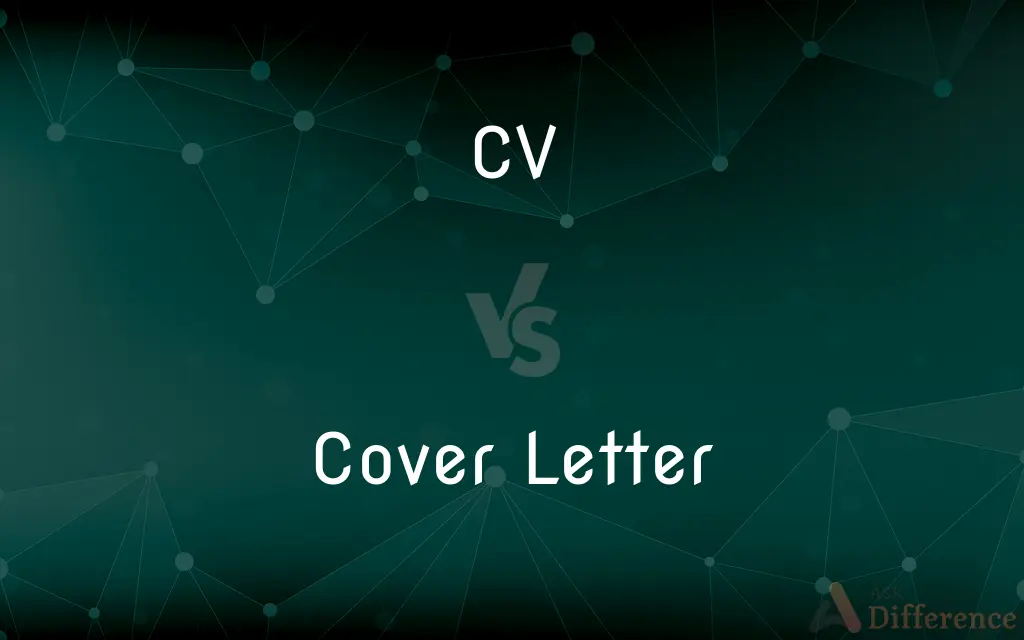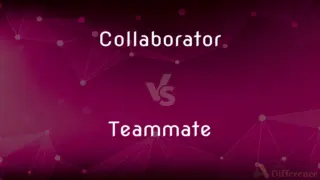CV vs. Cover Letter — What's the Difference?
By Tayyaba Rehman — Published on October 13, 2023
A CV (Curriculum Vitae) is a detailed document highlighting one's education and career history; a Cover Letter is a concise, personalized introduction and pitch addressed to a prospective employer, emphasizing one’s suitability for a position.

Difference Between CV and Cover Letter
Table of Contents
ADVERTISEMENT
Key Differences
A CV, or Curriculum Vitae, is a comprehensive document that provides detailed information about one’s academic background, professional experience, skills, and qualifications. It serves as a structured summary of an individual's career journey. In contrast, a Cover Letter is a brief, personalized document that accompanies the CV, specifically tailored for a job application, expressing the individual’s interest in and suitability for the job.
The CV is generally factual and chronological, outlining one’s education, work experience, skills, and accomplishments without much subjective interpretation or personal narrative. On the other hand, a Cover Letter is highly subjective and narrative-driven, allowing the applicant to express their motivations, personality, and how they align with the job’s requirements and the company’s mission.
While a CV remains relatively constant, with updates for new experiences or qualifications, the Cover Letter is dynamic and requires modification for each job application to address the specific needs and requirements of the job and to reflect the applicant's understanding of and enthusiasm for the role. The CV lays out the facts, whereas the Cover Letter tells a story, elucidating the reasons behind career choices and expressing the individual's professional aspirations and passion.
In a CV, the emphasis is on completeness and accuracy, and it often uses bullet points to organize information clearly and concisely. In contrast, a Cover Letter places emphasis on coherence and persuasion, presented in paragraph form, intending to convince the employer of the candidate's fit and potential contribution to the company.
Conclusively, while both the CV and Cover Letter are integral components of a job application, they serve distinct purposes. The CV presents a factual and organized summary of one’s professional life, and the Cover Letter offers a personalized and persuasive narrative, highlighting the individual’s fit and enthusiasm for the specific role.
ADVERTISEMENT
Comparison Chart
Purpose
To provide a detailed overview of one's education, qualifications, and career history.
To introduce oneself and pitch one’s suitability for a specific position, emphasizing alignment with job requirements and company values.
Nature
Factual and structured
Personalized and narrative-driven
Length
Generally longer, comprehensive
Concise, typically one page
Modification
Remains constant, with periodic updates
Requires modification for each job application
Presentation Format
Organized with bullet points, headings, and sections
Written in paragraph form
Compare with Definitions
CV
A CV is a comprehensive document outlining an individual’s entire career history.
Emma’s CV provided a chronological overview of her professional journey.
Cover Letter
A Cover Letter accompanies a CV or resume as part of a job application.
Karen’s cover letter provided additional context to her CV, emphasizing her passion for graphic design.
CV
A CV serves as a factual summary of one’s skills, accomplishments, and academic background.
Mark’s CV highlighted his diverse skill set and numerous accomplishments in software development.
Cover Letter
A Cover Letter is tailored for a specific job, highlighting alignment with the role’s requirements.
Rachel’s cover letter was meticulously crafted to reflect her understanding of the role and her relevant skills and experiences.
CV
A CV is structured and organized, typically using bullet points and clear headings.
Lisa’s CV was well-organized, with distinct sections for education, experience, and skills.
Cover Letter
A Cover Letter is concise, typically consisting of three to four paragraphs.
Tom’s brief but compelling cover letter effectively showcased his qualifications and motivation for the sales role.
CV
A CV is a detailed written account of one's education, professional experience, and qualifications.
John’s CV meticulously listed all his academic achievements and work experiences.
Cover Letter
A Cover Letter is a personalized document expressing one’s interest and suitability for a job.
Michael’s cover letter effectively conveyed his enthusiasm for the marketing position and his relevant experiences.
CV
A CV is generally longer and more detailed than a resume, especially in academic and research contexts.
Dr. Smith’s extensive CV included a comprehensive list of her publications, presentations, and research projects.
Cover Letter
A Cover Letter is narrative-driven, allowing candidates to express their motivations and career aspirations.
Sarah’s cover letter narrated her professional journey and expressed her desire to contribute to the company’s success.
CV
Same as curriculum vitae; - a commonly used initialism.
CV
A summary of your academic and work history
CV
Being five more than one hundred
Common Curiosities
What is the purpose of a CV?
A CV provides a detailed and structured overview of one’s education, qualifications, and career history to prospective employers.
How long is a typical CV?
A CV can be multiple pages long, especially for individuals with extensive education and experience, but it should be concise and relevant.
What is the purpose of a Cover Letter?
A Cover Letter introduces the candidate to the employer, expressing interest in and suitability for a specific position, and highlighting alignment with the job’s requirements.
Is a Cover Letter necessary for every job application?
While not always required, a Cover Letter is highly recommended as it provides an opportunity to express one’s motivations and suitability for the role.
Is a CV more detailed than a resume?
Yes, a CV is generally more detailed and longer than a resume, especially in academic and research contexts.
How long should a Cover Letter be?
A Cover Letter is typically one page long, consisting of three to four concise paragraphs.
How often should a CV be updated?
A CV should be updated regularly to include new experiences, qualifications, skills, and accomplishments.
Should a Cover Letter be generic?
No, a Cover Letter should be tailored for each job application, reflecting the candidate’s understanding of the role and company.
Can a CV include personal interests and hobbies?
Yes, a CV can include personal interests and hobbies, especially if they are relevant to the job or demonstrate transferable skills.
What should be the tone of a Cover Letter?
The tone of a Cover Letter should be professional yet conversational, expressing enthusiasm for the role and company.
What is the main focus of a Cover Letter?
The main focus of a Cover Letter is to highlight the candidate’s fit for the role, emphasizing relevant skills, experiences, and motivations.
Should a CV have a photo?
Including a photo on a CV is not a universal requirement and may vary depending on the industry, company, and country.
Share Your Discovery

Previous Comparison
Collaborator vs. Teammate
Next Comparison
Debate vs. DialogueAuthor Spotlight
Written by
Tayyaba RehmanTayyaba Rehman is a distinguished writer, currently serving as a primary contributor to askdifference.com. As a researcher in semantics and etymology, Tayyaba's passion for the complexity of languages and their distinctions has found a perfect home on the platform. Tayyaba delves into the intricacies of language, distinguishing between commonly confused words and phrases, thereby providing clarity for readers worldwide.
















































